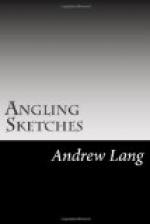Let it sink or let it swim.
I often don’t see the trout rise to me, if he is such a fool as to rise; and I can’t strike in time when I do see him. Besides, I am unteachable to tie any of the orthodox knots in the gut; it takes me half an hour to get the gut through one of these newfangled iron eyes, and, when it is through, I knot it any way. The “jam” knot is a name to me, and no more. That, perhaps, is why the hooks crack off so merrily. Then, if I do spot a rising trout, and if he does not spot me as I crawl like the serpent towards him, my fly always fixes in a nettle, a haycock, a rose-bush, or whatnot, behind me. I undo it, or break it, and put up another, make a cast, and, “plop,” all the line falls in with a splash that would frighten a crocodile. The fish’s big black fin goes cutting the stream above, and there is a sauve qui peut of trout in all directions.
I once did manage to make a cast correctly: the fly went over the fish’s nose; he rose; I hooked him, and he was a great silly brute of a grayling. The grayling is the deadest-hearted and the foolishest-headed fish that swims. I would as lief catch a perch or an eel as a grayling. This is the worst of it—this ambition of the duffer’s, this desire for perfection, as if the golfing imbecile should match himself against Mr. Horace Hutchinson, or as the sow of the Greek proverb challenged Athene to sing. I know it all, I deplore it, I regret the evils of ambition; but c’est plus fort que moi. If there is a trout rising well under the pendant boughs that trail in the water, if there is a brake of briars behind me, a strong wind down stream, for that trout, in that impregnable situation, I am impelled to fish. If I raise him I strike, miss him, catch up in his tree, swish the cast off into the briars, break my top, break my heart, but—that is the humour of it. The passion, or instinct, being in all senses blind, must no doubt be hereditary. It is full of sorrow and bitterness and hope deferred, and entails the mockery of friends, especially of the fair. But I would as soon lay down a love of books as a love of fishing.
Success with pen or rod may be beyond one, but there is the pleasure of the pursuit, the rapture of endeavour, the delight of an impossible chase, the joys of nature—sky, trees, brooks, and birds. Happiness in these things is the legacy to us of the barbarian. Man in the future will enjoy bricks, asphalte, fog, machinery, “society,” even picture galleries, as many men and most women do already. We are fortunate who inherit the older, not “the new spirit”—we who, skilled or unskilled, follow in the steps of our father, Izaak, by streams less clear, indeed, and in meadows less fragrant, than his. Still, they are meadows and streams, not wholly dispeopled yet of birds and trout; nor can any defect of art, nor certainty of laborious disappointment, keep us from the waterside when April comes.




